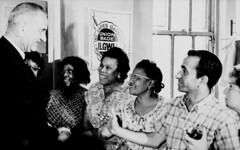
Democratic hopes of retaking the Wisconsin State Senate were dashed in Tuesday’s recall election. The Democrats, backed by organized labor, successfully recalled two Republican senators but failed to unseat four others. In order to retake the Senate, Democrats would have had to win three recalls yesterday and save two Democratic senators from recall next week.
Historically speaking, two recalls in one day is unprecedented. Only 13 U.S. state legislators have ever been recalled and voters have never recalled more than two representatives in a single year. On Tuesday, Wisconsin voters recalled as many legislators in one day as they’d recalled in last 80 years.
Most recall races are strictly local affairs, but the recall fight in Wisconsin was a counterattack against a state-level agenda, an agenda that other governors and state legislators are trying to replicate across the country.
Scott Walker did not campaign on a promise to eliminate collective bargaining for public sector workers, but that’s what he did. Republicans control both the State Assembly and the State Senate, so, once elected, Walker had broad power to enact his previously unspoken agenda.
Yesterday’s attempt to recall Walker’s allies en masse was the latest in a series of bold and creative assaults on the Walker agenda. In February, the Democratic state senators fled the state to stop Walker from passing his anti-collective bargaining bill by denying a quorum in the Senate.
While the senators were in exile in Illinois, tens of thousands of anti-Walker, pro-union protesters converged on the state capital. One day in early March, 150,000 braved freezing temperatures to hold one of the largest pro-labor demonstrations in American history. Greg Sargent of the Washington Post won a Sidney Award for his coverage of these protests.
After a three-week standoff, Walker and his allies used procedural tricks to pass the bill without the absent senators, but the fight continued in the courts. Walker’s opponents scored some early victories in the lower court and the implementation of the law was delayed. Hoping to tip the balance of power on the State Supreme Court, which would ultimately hear challenges to Walker’s law, progressives backed challenger JoAnn Kloppenburg against incumbent David Prosser. Kloppenburg lost. In June, the deeply divided court reinstated Walker’s law.
Sargent summed up yesterday’s results as follows:
Yesterday unions and Democrats fell just short of victory in Wisconsin, winning two of six races to recall GOP state senators, in a battle that had unexpectedly emerged as ground zero in a national class war, partly over the fate of organized labor. There’s no way to sugar-coat it: Unions and Dems failed in their objective as they defined it, which was to take back the state senate, put the brakes on Scott Walker’s agenda, and let the nation know that elected officials daring to roll back public employee bargaining rights would face dire electoral consequences.
But nonetheless, what they failed to accomplish does not diminish what they did successfully accomplish. The fact that all these recall elections happened at all was itself a genuine achievement.
The struggle in Wisconsin is often portrayed as a clash of well-matched opponents–Democrats vs. Republicans or Big Labor vs. Big Business. In fact, the Democrats and their allies have been waging an irregular war against a much more powerful opponent. The Republicans control every branch of state government.
In each skirmish, the Democrats and their allies have faced long odds and achieved far more than anyone in the political establishment would have predicted. The anti-Walker forces have proven implacable, even in defeat. Their resiliance proves that public sector workers are not the easy targets that Republicans assumed they would be.
Insurgents can’t expect to rout their enemy in any single decisive battle. If they win, they win by wearing down their opponents over time.
[Photo credit: Sue Peacock, Creative Commons. Madison, WI, March, 2011.]



 This week, the Hillman Foundation gave the
This week, the Hillman Foundation gave the 

